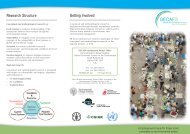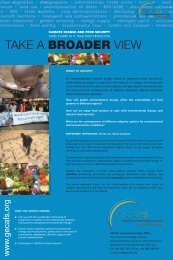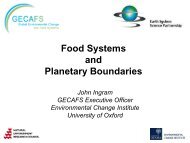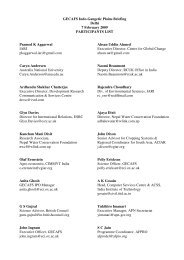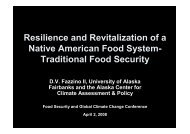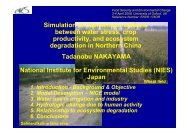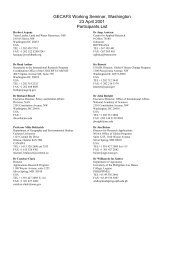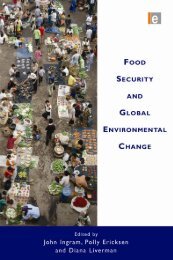From Food Production to Food Security - Global Environmental ...
From Food Production to Food Security - Global Environmental ...
From Food Production to Food Security - Global Environmental ...
- No tags were found...
You also want an ePaper? Increase the reach of your titles
YUMPU automatically turns print PDFs into web optimized ePapers that Google loves.
the UNEP’s <strong>Global</strong> Environment Outlooks (GEO-3 and GEO-4: UNEP, 2002, 2007), butsuch analyses do not necessarily feature issues that are of particular relevance at the givenregional level (Zurek and Henrichs, 2007).Downscaling global scenarios <strong>to</strong> national (or even local) level has been considered by anumber of authors (e.g. Lebel et al., 2006; Biggs et al., 2007; Kok et al., 2007) but, while acommonly agreed approach is still lacking, downscaling methods and theories are becomingmore common (e.g. Zurek and Henrichs, 2007). Upscaling has, however, proven <strong>to</strong> be moredifficult and remains one of the largest challenges. Some argue that global downscaling limitsthe creativity and diversity of regional scenarios and call for more upscaling efforts. Othersargue that upscaling will fail because of the lack of a common framework in terms of drivers,time horizon, definitions etc. (see Alcamo et al., 2008). So, while there are a large number ofdetailed global scenarios available, their potential has been undervalued for developingscenarios at regional level.The current state-of-the-art is <strong>to</strong> embark upon a cross-level methodology in which globalscenarios are first downscaled and used <strong>to</strong> produce regional or local scenarios without beingprescriptive, after which local scenarios are used <strong>to</strong> enrich the existing global s<strong>to</strong>rylines in aniterative procedure, often using qualitative s<strong>to</strong>rylines as well as quantitative models. Creatingregional scenarios is not just a matter of ‘downscaling’ the information available in globalscenarios (e.g. climate change projections) for regional use; some information (such as trendsin trade) will have been built up from lower levels. Other information will be new and willneed <strong>to</strong> come directly from the region in question (Zurek and Henrichs, 2007). Regional‘s<strong>to</strong>rylines’ of plausible futures can share some of the key assumptions with global-levels<strong>to</strong>rylines, i.e. be coherent with global assumptions, yet regionally ‘enriched’, as was the casefor the GECAFS Caribbean exercise (Box 3). Similarly, the Southern African Sub-<strong>Global</strong>Assessment (SAfMA) (Biggs et al., 2004) adapt existing scenarios, stressing governance as amajor driver and developing two regional s<strong>to</strong>rylines, African Patchwork and AfricanPartnership. These can be mapped <strong>to</strong> the MA <strong>Global</strong> Scenarios.Box 3 The GECAFS Caribbean Scenarios Exercise.In 2005, with funding from ICSU and UNESCO, GECAFS, in collaboration with FAO, UNEP, theMillennium Ecosystem Assessment and the European Environment Agency, developed the conceptualframeworks and methods necessary <strong>to</strong> formulate a set of pro<strong>to</strong>type scenarios for researching theinteractions between food security and environmental change at the Caribbean regional level. Thesescenarios were specifically designed <strong>to</strong> assist analyses of possible regional policy and technicalinterventions for adapting food systems <strong>to</strong> environmental change so as <strong>to</strong> explore the medium- andlong-term prospects for given adaptation options for food security. The innovative operationalframework was based on theoretical advances in the notion of food systems and their vulnerability <strong>to</strong>GEC, and downscaling global scenarios <strong>to</strong> regional level.The Caribbean scenarios exercise involved about 30 people including social and natural scientistsfrom regional research institutions (e.g. the University of the West Indies (UWI) and the Caribbean95



